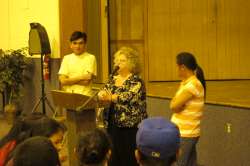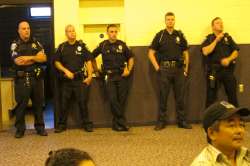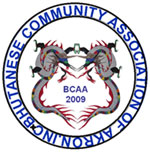|
||||||||||
| Following the shooting of Mon Bahadur Bhujel on August 26, 2012 in Akron, Ohio, members of the refugee community have been very concerned for their safety. The International Institute of Akron (IIA) arranged a meeting on August 29, 2012 with several representatives of the Akron Police Department to discuss the situation with local refugee communities. At the time of the meeting, Mon was still in critical condition. Bhim Dhungana and Kukupaw Lynn served as interpreters for Nepali and Burmese, respectively. | ||||||||||
 Reporters preparing for meeting |
 Bhim Dhungana (Nepali interpreter), Diane Johnson (IIA host), and Kukupaw Lynn (Koran interpreter) |
 Partial Audience View |
||||||||
|
The meeting started with expressions of concern for the refugees from
Diane Johnson, Executive Director of the International Institute of
Akron, and Lieutenant Simcox from the Akron City Police.
Several policemen were in attendance and they are all committed
to keeping each member of the refugee community safe.
There are striving to protect all the people of North Hill, and
they need help from all citizens.
Lieutenant Simcox acknowledged that this is the second major
crime against the refugee community and that identifying Mon's attacker
is the police's top priority. |
||||||||||
 |
Policeman Dan Postor (on left) asked citizens to call 911 if they see any suspicious activity. When you call, the police will have your phone number and address if you call from a land line; however, if you call from a cell phone, you will need to tell them the number and street where you observed the suspicious activity. Detective Mark Hockman (on right) described his work on investigating gang activity. He said that a lot of the gang activity involves gangs establishing their territory. In the past year, 168 gang members have been arrested in the State of Ohio.
|
|||||||||
| The policemen said that people should project confidence when they walk because criminals often look for people who won't fight back. Try to avoid trouble if you can, always walk with one or more other people. Run if you need to, or fight back if it is really necessary. | ||||||||||
 |
 |
 |
||||||||
|
Q Did the criminal who shot Mon Bhujel get arrested yet? A No, but we are working on it. It is our top priority. Q Did the second crime happen inside or outside the apartment? Q Are any of those two crimes related to religion? A Not sure about that and we cannot speculate without proof.
A
Do the best you can to remember
any aspects of a suspicious situation.
The police
A
Stop if you know the person,
but if you think the person is going to harm you,
A A policeman said that anywhere in the United States there are good and bad people.
A It is very hard but the International Institute is working on it.
|
||||||||||
| Bhakta Ghimire amplified the last question by saying: "When we were in Nepal we never had this criminal problem. We didn't have any protection but also we never got any harm. When we moved to America we expected American government to protect us from everything, but this is the second crime in our community. " | Diane Johnson said that the IIA knows that the refugees want to relocate from Carpenter Street and that they are doing what they can as fast as they can to relocate people to safer areas. | Ms. Rebecca Jenkins from the IIA talked about whether or not it was a good idea to have a gun for self-protection. She said there were many laws about owning and using guns and while you have a right to buy a gun, if you are found in violation of any gun laws, you could be deported. She said "Everybody wants you to be safe and able to stay legally in the United States." | ||||||||
|
This article was compiled by Terry Kuhn from reports written by Tara Dhungaga, Monaj Dhimal, Dulula Katel, Sajan Osti, and Champha Subba. |
||||||||||
|
|
||||||||||
